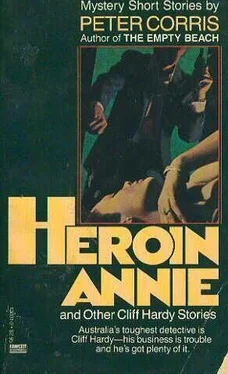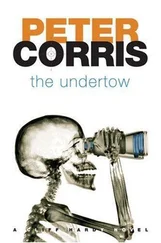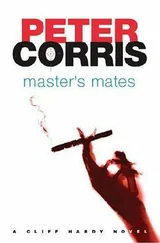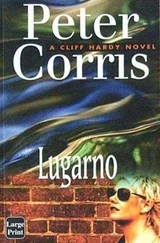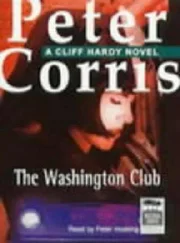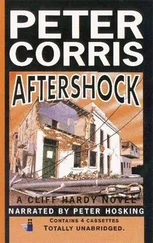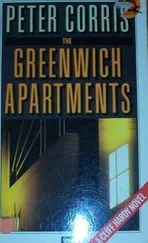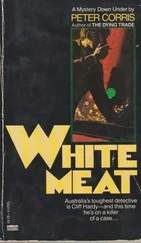Peter Corris - Heroin Annie
Здесь есть возможность читать онлайн «Peter Corris - Heroin Annie» весь текст электронной книги совершенно бесплатно (целиком полную версию без сокращений). В некоторых случаях можно слушать аудио, скачать через торрент в формате fb2 и присутствует краткое содержание. Жанр: Криминальный детектив, на английском языке. Описание произведения, (предисловие) а так же отзывы посетителей доступны на портале библиотеки ЛибКат.
- Название:Heroin Annie
- Автор:
- Жанр:
- Год:неизвестен
- ISBN:нет данных
- Рейтинг книги:4 / 5. Голосов: 1
-
Избранное:Добавить в избранное
- Отзывы:
-
Ваша оценка:
- 80
- 1
- 2
- 3
- 4
- 5
Heroin Annie: краткое содержание, описание и аннотация
Предлагаем к чтению аннотацию, описание, краткое содержание или предисловие (зависит от того, что написал сам автор книги «Heroin Annie»). Если вы не нашли необходимую информацию о книге — напишите в комментариях, мы постараемся отыскать её.
Heroin Annie — читать онлайн бесплатно полную книгу (весь текст) целиком
Ниже представлен текст книги, разбитый по страницам. Система сохранения места последней прочитанной страницы, позволяет с удобством читать онлайн бесплатно книгу «Heroin Annie», без необходимости каждый раз заново искать на чём Вы остановились. Поставьте закладку, и сможете в любой момент перейти на страницу, на которой закончили чтение.
Интервал:
Закладка:
‘The Sunday Post’, he said. He was a little roly-poly man who scratched his head a lot with a pencil. ‘Only ran for a year or so, that narrows it down.’
‘Still a lot of looking.’
‘Yeah. Hold on. Who’s this Clarke?’
I said I didn’t know.
‘Rings a bell’, he said. ‘Yeah, around that time. Come on we’ll look him up in the cuts.’
We went down to the library and he pulled out a metal drawer crammed with quarto size manila envelopes. All had names on them followed by occupations. Some were thin as if they could contain only a single sheet, others bulged fatly. Thomas Clarke’s file was thinnish. He was a unionist involved in a strike at a food processing plant in Wollongong in 1972. Clarke had refused to work with non-unionists and had been sacked. Reading between the lines of the cuttings, the message was that Clarke had been trying to unionise the plant and had run foul of the management. The strike lasted two months, and the unionists won. A large item on Clarke’s sacking had been published in The Sunday Post, and it included my photography. The men were picketing a supermarket in Wollongong which stocked the company’s products; a heavy man in the centre of the picture was identified as Clarke, the others shown were described as his ‘supporters’.
The sub made photostats of a few of the cuttings for me; I thanked him and left the building. Outside it was hot and cheerful, I felt pretty cheerful myself; I like the south coast, especially when someone’s paying me to go there. I walked back to the office, drove home to Glebe and packed a bag. I put in swimming trunks and a towel but I left the snorkel and speargun behind.
If you stay on the highway the drive to Wollongong is a two hour bore, if you turn off and go through the national park and the string of mining towns along the coast from Stanwell Park it’s a lot better. I took the slow route and drove past the camp sites and beaches that would soon be filling up with holidaying hedonists. Packed in between the sea and the scarp on which the land slips so that people can’t hang their timber and glass fantasies off it, the coal towns don’t seem to have changed much in the past twenty years. The ocean was a deep blue and crashing in firmly as if rehearsing for a long, hot summer. There were one or two caravans already in place, forerunners of the tent and caravan cities that would spring up soon and last until April. It was after six o’clock when I reached Wollongong; I checked into a motel down near the beach and went for a swim. My body was winter pale and the water was icy cold. It was a brief visit to the beach. I went back to the motel, showered and changed and watched the evening news on TV. After a couple of beers and a barbecued steak at the pub opposite the motel I was ready to go to work.
Dr William Dempsey lived in one of the fashionable hillside suburbs of Wollongong. I spoke on the telephone to his wife, who was also a New Zealander, and easily intrigued by the story of her husband’s long lost brother. Dr Dempsey was lecturing at the university that evening and expected home soon after eight; I was invited for nine. As soon as I hung up I regretted that I hadn’t asked what subject he taught-in my experience physicists and historians are as different as Afrikaners and Bantus. I arrived on time, and a thirtyish woman with a well-dressed, good figure let me in and took me through to a room which had a big window occupying most of one wall. The house was well up, and in the day the window would be full of first-class ocean view.
She got me a Scotch and soda which was about three times too strong. She stood in the doorway looking agitated, her carefully prepared black hair was a bit astray.
‘I’m sorry he’s late, Mr Hardy. He’s never late as a rule. The meal’s ruined.’
There was a noise from the back of the house and she went off to deal with it. The room had some comfortable chairs, a TV set and a coffee table; there were magazines and books on the table and more books on the floor near one chair and a whole lot more in a big bookcase. I took a sip of the Scotch and went over to look-they were mostly novels and biographies, but here and there other books had been stuck in or lain across the top of the rows. These were studies of workplaces, unions and aspects of the labour movement. Some had Dempsey’s name in them and so did some of the novels. He could be a political scientist, economist or sociologist, it’s hard to tell these days, but the novels ruled out physics.
Mrs Dempsey, who’d introduced herself as Rosemary, came back carrying a Scotch that looked nearly as strong as mine. She was very edgy.
‘That was Graham, our eldest’, she said, Td promised him his father would come in and say goodnight, I don’t know what to do.’
‘Have a drink and sit down.’ She was in that distracted state that comes from listening to your own fears. An outside voice is welcome and usually obeyed. She sat down and sipped mechanically.
‘Have you rung the university?’
‘Yes, just before you arrived. He left the lecture theatre on time.’
‘Would he stop off on the way, for cigarettes, wine?’
She shook her head.
‘Might have had a breakdown.’
‘He’s more than an hour late? She looked at me as if I were an idiotic child. ‘If he had a breakdown he’d call the NRMA and he’d call me!’
‘Let’s give him a few minutes.’ I forced her to talk and learned that Dempsey was a senior lecturer in sociology. He had a PhD from the ANU and they’d been in Wollongong for five years. I sipped the Scotch and tried to think of more to say but her eyes were screaming at me. I got up.
‘Okay, I’ll go and have a look for him. I’m sort of retained by the family anyway.’
She told me that Dempsey was a tall, thin man with spectacles, who’d been wearing light drill trousers and an army-style shirt. The car was a red VW beetle. I told her I’d call as soon as I knew anything and advised her to get a friend over for support. She said she would. I drove the obvious route to the university and heard no sirens, saw no flashing red or blue lights. It was a Monday night, quiet, with four TV channels available.
Dempsey was teaching a special course in industrial sociology, his wife had told me, and most of the students were adults who’d be rushing off to their own families and activities. The lectures were held in a set of halls at the northern end of the campus. I located them on the campus map and parked in the roadway at the front. The lights in the grounds were modern and bright but the lecture halls were in darkness. The doors were heavy jobs of the self-locking kind that could be operated by the last person out. I walked around the building and found a car park about fifty yards back surround by a chest-high hedge. I saw the shape of a VW in the corner of the park and broke into a run.
William Dempsey was lying on the ground beside the car with his feet under the hedge. One side of his face was covered with blood and it had flowed up into his hair and down into his shirt, soaking into one of the pockets. He wasn’t wearing spectacles. He was breathing evenly and the blood still oozed from a cut running along where his hair was parted. I opened the car door; there was a set of keys in the ignition and a briefcase on the passenger seat. Light from the car washed over Dempsey and he groaned. I squatted down beside him and told him to lie still.
He lifted one hand and let it flop back, then he tried a leg. ‘Who’re you?’
I told him and said I was going to ring for an ambulance.
‘No, wait.’ His voice was weak but urgent. ‘Rosemary told me you’d be coming.’ He screwed up his eyes and looked at me. The eye on the blood-smeared side came into life as well as the other, which was a comfort. ‘Don’t call an ambulance, just help me.’
Читать дальшеИнтервал:
Закладка:
Похожие книги на «Heroin Annie»
Представляем Вашему вниманию похожие книги на «Heroin Annie» списком для выбора. Мы отобрали схожую по названию и смыслу литературу в надежде предоставить читателям больше вариантов отыскать новые, интересные, ещё непрочитанные произведения.
Обсуждение, отзывы о книге «Heroin Annie» и просто собственные мнения читателей. Оставьте ваши комментарии, напишите, что Вы думаете о произведении, его смысле или главных героях. Укажите что конкретно понравилось, а что нет, и почему Вы так считаете.
